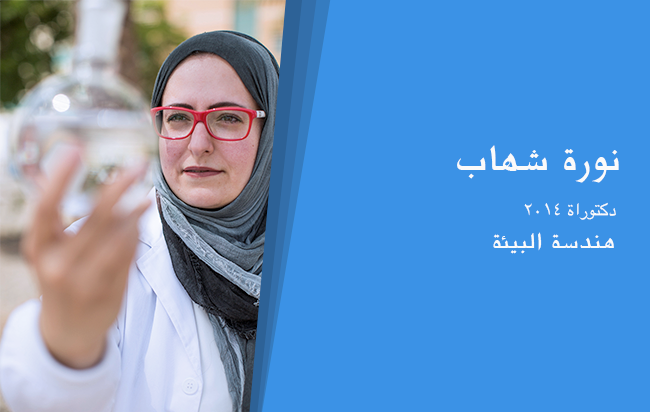Alumni Focus: Noura Shehab, Ph.D. 2014 in Environmental Engineering, BESE

Noura Shehab graduated from the University in 2014 with a Ph.D. in environmental engineering and is currently working as a material science researcher at RPD Innovations. Photo courtesy of Noura Shehab.
- By David Murphy, KAUST News
Noura Shehab graduated from KAUST in 2014 with a Ph.D. in environmental engineering and is currently working as a materials science researcher at RPD Innovations. She describes her current role as a mixture of technology analysis, business planning, market assessment, prototyping and the application of science—in particular, science that has the potential to positively impact daily life.
Shebab's research interests focus on novel microbial electrochemical technologies and microorganisms for power generation and desalination. She has received several local and international awards in recognition of her ideas on the development of sustainable solutions to water scarcity in arid and semi-arid regions. In 2013, she led a team of five students from KAUST to participate in the Dubai regional final of the 4th Annual Hult Prize.
Prior to KAUST, Shehab studied at King Abdulaziz University in Jeddah, where she completed her
bachelor's degree in microbiology. Shebab is also the incoming KAUST Saudi Arabian alumni chapter president.
"KAUST is the best place to develop your personality and raise your academic level. I can see a huge difference in my personality after KAUST. I know how to express my points in my work and I know what I want to do in my life," she said. "The University is very special. It has great minds and facilities and it's a place that any researcher would like to be to further his or her research."
Her guidance for current students is to continue to be creative and ambitious and to always keep learning. She advises students to engage with career fair activities that will help them better understand the business industry and decide whether that is something they want to become part of or continue with a focus on academia.
"At KAUST, you will gain knowledge and family, so use your time wisely. You also learn acceptance, resilience and commitment, qualities that will help you face any challenges in your life after and impact the world with good work—as a scientist or a leader," she added.
Shehab has a committed vision of her future and her career path. "I really would like to be part of the scientific innovation and development of novel technologies in the region for technologies that will really develop our economy as well as contribute to the quality of life," she said.
Related stories:
- Pioneering research from sea to space
- Sharing memories at 2016 Alumni Reunion Weekend
- Building minds at KAUST
- Inaugural in-Kingdom Alumni Chapter reunion held at KAUST
- A student's journey from KAUST to Stanford
-
Former KAUST student featured in Nature

